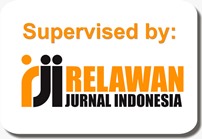ANALYZING THE EFFECT OF STOCK MARKET CAPITALIZATION AND FINANCIAL TECHNOLOGY ADOPTION ON BANK PROFITABILITY
Abstract
The main objective of this research is to examine how stock market capitalization and the adoption of financial technology services affect on banking profitability. This study used a quantitative-descriptive research design with the research strategy adopted is a case study at Bank Central Asia (BCA). This study utilized the secondary data in an annual time series format spanning from 2017 to 2021. The return on Asset (ROA) of BCA as a proxy of bank profitability is a dependent variable. Whereas the stock market capitalization and value transaction of mobile banking and internet banking is the proxy of financial technology services as the independent variables. Program SPSS version 26 was employed to process the data for performing the Classical Assumption Test, the Multiple Linear Regression, the t-Test, and the Coefficient of Determination Test. The findings of current research prove that stock market capitalization and the adoption of financial technology service has a positive and significant impact on BCA’s profitability. This finding indicates that profitability increases with an increase in capitalization and enhance the adoption of financial technology service by the bank.
Full Text:
PDFReferences
Almumani, M. A. Y. (2018). An Empirical Study on Effect of Profitability and Market Value Ratios on Market Capitalization of Infrastructural Companies in India. International Journal of Business and Social Science, 9(4), 39–45. https://doi.org/10.30845/ijbss.v9n4p6
Alshehadeh, A. R., & Al-Khawaja, H. A. (2022). Financial Technology as a Basis for Financial Inclusion and its Impact on Profitability: Evidence from Commercial Banks. International Journal of Advances in Soft Computing and Its Applications, 14(2), 125–138. https://doi.org/10.15849/IJASCA.220720.09
Angori, G., Aristei, D., & Gallo, M. (2019). Determinants of Banks ’ Net Interest Margin : Evidence from the Euro Area during the Crisis and Post-Crisis Period. Sustainability, 11(14), 1–20.
Arif, M., & Masdupi, E. (2020). Pengaruh Internet Banking Terhadap Kinerja Perbankan. Jurnal Ecogen, 3(4), 598. https://doi.org/10.24036/jmpe.v3i4.10435
Bank Indonesia. (2021). Laporan Perekonomian Indonesia 2021. http://journal.um-surabaya.ac.id/index.php/JKM/article/view/2203
Bett, F. C., & Bogonko, J. B. (2017). Relationship between Digital Finance Technologies and Profitability of Banking Industry in Kenya. … Academic Journal of Economics and Finance, 2(3), 34–56. http://www.iajournals.org/articles/iajef_v2_i3_34_56.pdf
Bikker, J. A., & Vervliet, T. M. (2018). Bank profitability and risk ‐ taking under low interest rates. International Journal of Finance & Economics, 23(1), 3–18. https://doi.org/10.1002/ijfe.1595
Das, S. R., Ostrov, D., Radhakrishna, A., & Srivastav, D. (2018). A New Approach to Goals-Based Welath Management. Journal of Invesmnet Management, 16(3), 4–30.
Esmaeili, A., Haghgoo, I., Davidaviciene, V., & Meidute-kavaliauskiene, I. (2021). Customer Loyalty in Mobile Banking : Evaluation of Perceived Risk , Relative Advantages , and Usability Factors. Inzinerine Ekonomika-Engineering Economics, 32(1), 70–81.
Eze, G. P., & Egoro, S. (2016). Electronic Banking and Profitability of Commercial Banks in Nigeria. Journal of Finance and Economic Research, 3(1), 2251–15. http://absudbfjournals.com/wp-content/uploads/2017/02/Electronic-Banking-and-Profitability-of-Commercial-Banks-in-Nigeria.pdf
Haris, M., Tan, Y., Malik, A., & Ain, Q. U. (2020). A Study on the Impact of Capitalization on the Profitability of Banks in Emerging Markets: A Case of Pakistan. Journal of Risk and Financial Management, 13(9), 1–21. https://doi.org/10.3390/jrfm13090217
Hariyanto, D. (2021). Effect of Trading Volume, Market Capitalization, Firm Size in explaining Return on Vultures. Journal of Advanced Research in Economics and Administrative Sciences, 2(2), 50–64. https://doi.org/10.47631/jareas.v2i2.228
Ghozali, Imam. 2016. Aplikasi Analisis Multivariete Dengan Program
IBM SPSS 23 (Edisi 8). Cetakan ke VIII. Semarang : Badan Penerbit
Universitas Diponegoro
Imamah, N., & Safira, D. A. (2021). Pengaruh Mobile Banking Terhadap Profitabilitas Bank Di Bursa Efek Indonesia. Profit: Jurnal Administrasi Bisnis, 15(01), 95–103. https://doi.org/10.21776/ub.profit.2021.015.01.10
Khan, M. Y., Javeed, A., Mehmood, N., & Khan, W. (2019). Mobile Banking Service Quality and Customer Satisfaction: An Application of Carter Model. Sarhad Journal of Management Sciences, 5(1), 15–26. https://doi.org/10.31529/sjms.2018.5.1.2
Kota, T. P., & Kusumastuti, S. Y. (2022). Analisis Pengaruh Minat Nasabah Dalam Menggunakan Mobile Banking Dengan Menggunakan Kerangka Technology Acceptance Model (Tam). Jurnal Apresiasi Ekonomi, 10(3), 276–288. https://doi.org/10.31846/jae.v10i3.515
Kumar, M. P., & Kumara, N. V. M. (2020). Market capitalization: Pre and post COVID-19 analysis. Materials Today: Proceedings, 37(2), 2553–2557. https://doi.org/10.1016/j.matpr.2020.08.493
Medyawati, H., Yunanto, M., & Hegarini, E. (2021). Financial Technology as Determinants of Bank Profitability. Journal of Economics, Finance and Accounting Studies, 3(2), 91–100. https://doi.org/10.32996/jefas.2021.3.2.10
Moridu, I. (2020). Pengaruh Digital Banking terhadap Nilai Perusahaan Perbankan (Studi Pada PT . Bank Negara Indonesia ( Persero ) Tbk ). Jurnal Riset Akuntansi Politala, 3(2), 67–73.
Schell, J. M., Koren, K. M., & Endreny, P. L. (2014). Private Equity Funds. In Law Journal Press. https://doi.org/10.4337/9781849805957.00043
Sharma, S., & Anand, A. (2018). Income diversification and bank performance : evidence from BRICS nations. International Journal of Productivity and Performance Management, 67(9), 1625–1639. https://doi.org/10.1108/IJPPM-01-2018-0013
Simatupang, A., & Siska, E. (2021). Strategi Financial Technology dalam Mengatasi Lonjakan Transaksi Lender pada Masa Pandemi Covid 19. KAMBOTI: Jurnal Ilmu Sosial Dan Humaniora, 1(2), 174–181. https://doi.org/https://doi.org/10.51135/kambotivol1iss2pp173-181
Siska, E. (2022). Financial Technology (FinTech) and Its Impact on Financial Performance of Islamic Banking. ARBITRASE: Journal of Economics and Accounting, 2(3), 102–108. https://doi.org/10.47065/arbitrase.v2i3.338
Sudaryanti, D. S., Sahroni, N., & Kurniawati, A. (2018). Analisa Pengaruh Mobile Banking terhadap Kinerja Perusahaan Sektor Perbankan yang Tercatata di Bursa Efek Indonesia. Jurnal Ekonomi Manajemen, 4(2), 96–107.
Wulandari, S., & Novitasari, N. (2021). Pengaruh E-Banking Terhadap Kinerja Keuangan Perbankan Yang Terdaftar Di Bursa Efek Indonesia. Jesya Jurnal Ekonomi Dan Dan Ekonomis Syariah, 4(1), 166–177. https://doi.org/10.47354/mjo.v3i1.284
Yudaruddin, R. (2020). Mobile Banking, Kinerja dan Stabilitas Keuangan: Studi Empiris di Perbankan Indonesia. Buletin Riset Kebijakan Perbankan, 2(1), 3–23.
DOI: https://doi.org/10.31846/jae.v11i2.623
Refbacks
- There are currently no refbacks.

This work is licensed under a Creative Commons Attribution-NonCommercial-NoDerivatives 4.0 International License.
e-Jurnal Apresiasi Ekonnomi Indexed by:












